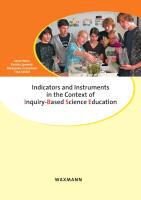Read more
This report documents indicators and instruments in the context of inquiry-based science education (IBSE). It is embedded in a project that aims at disseminating inquiry-based science teaching on a large scale across Europe.
Recent research about IBSE is rather specific to individual research questions and focuses on single aspects of IBSE. Furthermore, the instruments and indicators underlying the different studies are predominately not systematically covered. In this report single indicators and instruments in the context of science education are brought together. Thereby a coherent database and a link to different research results are presented.
The indicators and instruments in this report originate from a systematic literature review about IBSE from 2005-2009. To receive a comprehensive picture about research on IBSE the scope of this review contains instructional aspects (1), implementation areas of politics/stakeholders (2) and teacher education and teacher professional development (3).
This report contributes to supplying a systematic overview about instruments and indicators in the field of IBSE. It addresses researchers, politicians and stakeholders, teacher educators and teachers who are interested in methods of research and dissemination in the context of science education and IBSE.
List of contents
1. Introduction 1.1 Literature Search 1.2 Classification and Coding 1.3 Results 1.4 Discussion 1.5 Editing the Indicators and Instruments 2. Policy and School Management 2.1 Cognitive Measures 2.2 Affective-Motivational Measures 2.3 Metacognitve Measures 3. Teacher Education 3.1 Cognitive Measures 3.2 Affective-Motivational Measures 3.3 Metacognitive Measures 4. Teacher Professional Development 4.1 Cognitive Measures 4.2 Affective-Motivational Measures 4.3 Metacognitive Measures 5. Instruction and the Classroom - Teachers 5.1 Affective-Motivational Measures 5.2 Metacognitive Measures 6. Instruction and the Classroom - Students 6.1 Cognitive Measures 6.2 Affective-Motivational Measures 6.3 Metacognitive Measures
About the author
Jana Heinz (Dr. phil.) ist wissenschaftliche Assistentin am Friedl Schöller-Stiftungslehrstuhl für Unterrichts- und Hochschulforschung und Dozentin für Soziologie an der TUM School of Education. Sie studierte von 1990 bis 1996 Deutsch als Fremdsprache und Anglistik-Amerikanistik an der Friedrich-Schiller-Universität in Jena. Dort promovierte sie 2006 am Lehrstuhl für allgemeine und theoretische Soziologie. Ihre Forschungsschwerpunkte liegen auf der Analyse der Effekte von Lehr- und Lernmethoden, Assessment-Methoden und dem Zusammenhang zwischen Sozialisationsbedingungen von Kindern und deren Schulkarrieren.

